Exactly! Understanding your skin type is crucial for developing an effective skincare routine. Here's a brief overview of each skin type and some general guidelines for caring for them:
Oily Skin: Oily skin tends to produce excess sebum, leading to a shiny complexion and enlarged pores. It's prone to acne and blemishes. Skincare for oily skin should focus on controlling oil production and preventing breakouts. This often involves using gentle, oil-free cleansers, non-comedogenic moisturizers, and products with ingredients like salicylic acid or benzoyl peroxide to help manage acne.
Dry Skin: Dry skin lacks moisture, often feeling tight and rough. It can be prone to flakiness, redness, and irritation. Skincare for dry skin should aim to hydrate and nourish the skin barrier. This may involve using rich, moisturizing cleansers, hydrating serums, and thick creams or oils to lock in moisture. Ingredients like hyaluronic acid and ceramides are beneficial for dry skin.
Combination Skin: Combination skin is a mix of oily and dry areas, with some parts of the face being oilier (usually the T-zone) while others are drier. Skincare for combination skin should balance hydration without exacerbating oiliness. This might involve using lightweight, non-comedogenic products and adjusting the skincare routine based on the needs of different areas of the face.
Sensitive Skin: Sensitive skin is prone to reactions such as redness, itching, or burning in response to skincare products, environmental factors, or certain ingredients. Skincare for sensitive skin should focus on gentle, soothing ingredients to minimize irritation. Fragrance-free, hypoallergenic products with minimal ingredients are often recommended. Patch testing new products and avoiding harsh treatments are also essential for sensitive skin care.
It's important to note that individual skin types can vary, and what works for one person may not work for another. Experimenting with different products and routines while paying attention to how your skin responds is key to finding the best approach for you. Additionally, factors like age, hormones, climate, and lifestyle habits can also influence your skin's needs. Consulting with a dermatologist can provide personalized recommendations tailored to your specific skin concerns.

